Exiled Prince Prays In Jerusalem For Resuming Iran-Israel Ties
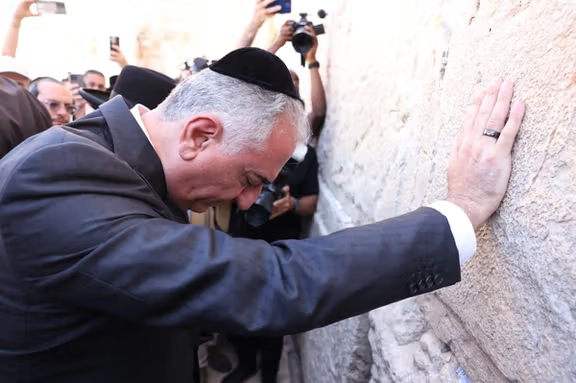
Prince Reza Pahlavi has prayed for peace between Israel and Iran on a visit to the Western Wall in Jerusalem on Tuesday.

Prince Reza Pahlavi has prayed for peace between Israel and Iran on a visit to the Western Wall in Jerusalem on Tuesday.
The exiled son of the Shah voiced his hopes that one day in the future the two nations can resume their historical friendship.
Publishing a photo of himself at the Western Wall on Tuesday, Pahlavi tweeted that 2,500 years ago, Cyrus the Great liberated the Jewish people from captivity and helped them rebuild their Temple in Jerusalem.
He said: “It is with profound awe that I visit the Western Wall of that Temple and pray for the day when the good people of Iran and Israel can renew our historic friendship.”
He quoted a verse from the Holy Hebrew Bible saying, “So said Cyrus, the king of Persia, ‘All the kingdoms of the earth the Lord God of the heavens delivered to me, and He commanded me to build Him a House in Jerusalem, which is in Judea.’”
He also read Psalms, guided by a local rabbi, while praying for peace between the two nations.
Pahlavi’s visit with his wife to the Western Wall on Tuesday morning had been arranged by Israeli Intelligence Minister Gila Gamliel.
While hundreds of others prayed at the Western Wall during the Holocaust Memorial Day siren, Pahlavi stood in reflection with the rest of the congregation for two minutes.
As part of his historic visit to the Jewish state, Pahlavi also met with Israel's Prime Minister Benjamin Netanyahu in Jerusalem and attended a Holocaust Remembrance Day ceremony at Yad Vashem. Although he stood alongside Netanyahu and Israel's President Isaac Herzog, he did not make a speech.
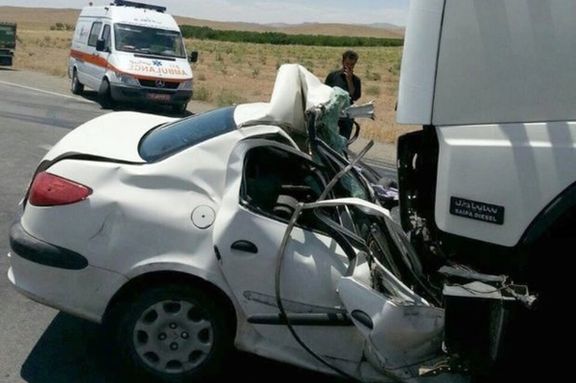
A horrific death toll of at least 1,168 fatalities has been claimed in road accidents in Iran during the new year holidays.
The shocking figure is an indictment of the poor state of roads and cars in Iran, which has one of the world’s worst traffic safety records.
The devastating total represents a rise of 22 deaths on Norwuz last year, when 1,146 people died in Iran over the holiday period.
The new figures were revealed on Monday by the head of Iran’s Forensic Medicine Organisation, Abbas Masjedi Arani: “During the implementation of a safety plan on the country's roads from March 16 to April 4, at least 1,168 people died in traffic accidents.”
The tragic death toll comes despite supposed measures and plans by the regime to improve road safety.
Iran’s Police Chief Ahmad-Reza Radan had claimed on April 1 that during the Nowruz holidays "we saw a decrease in road casualties in the country."
Nowruz is a major Iranian holiday that is celebrated annually on the first day of spring. This year, the holiday was marred by a tragic surge in road accident deaths while thousands of others were also injured.
The causes of the road accident deaths in Iran are varied. Poor road conditions, reckless driving, and inadequate safety measures are some of the main culprits, but the regime tries to convince citizens that the “human factor,” or the drivers, is the main reason.
Between March 2021 and March 2022, traffic-related accidents claimed the lives of nearly 17,000 Iranians. One person dies in a road accident every half hour in Iran according to local media.
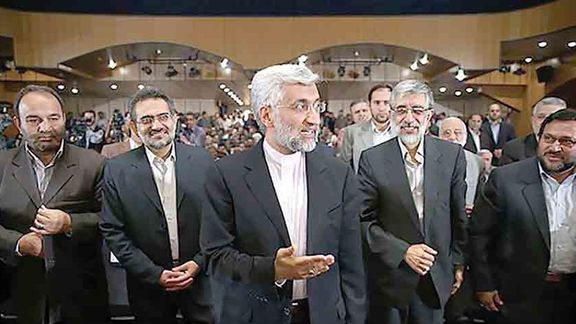
As Iran’s conservatives face an uphill task in next year’s elections, they also debate whether the regime should be a ‘republic’, or based on full clerical rule.
The sorrow state of Iran’s economy has put the conservative-hardliner forces in charge of both the parliament and the president on the back foot prior to parliamentary election next March.
Conservative politician Hossein Kanaani Moghaddam believes that parliament speaker Mohammad Bagher Ghalibaf and his allies will be among the most serious contestants within the conservative camp in the next election.
Asked how he would describe the configuration of conservative parties in the competition now that there is an all conservative government in Iran, Moghaddam said: The competition dates back to the fundamental difference in Iran's conservative camp between an "Islamic Republic" and an "Islamic government." He said each one of those ideas have their own supporters among conservatives. However, he said that without an Islamic Republic, it is impossible to create an Islamic government.
The Islamic Republic, as it exists and operates today, is based on the idea of the people's rule. However, in practice the Supreme Leader has absolute power. The interventions by Ali Khamenei and his Guardian Council and other centers of power under his control have left very little of the regime's democratic façade.
The idea of Islamic government, on the other hand, which was outlined by Ayatollah Ruhollah Khomeini the founder of the Islamic regime in Iran, is based on the idea of the holy Koran being the Constitutional Law of the government. When he came to power, Khomeini spoke very little about his book, The Islamic Government, in which Shiite clerics rather than the members of the parliament should make key decisions.
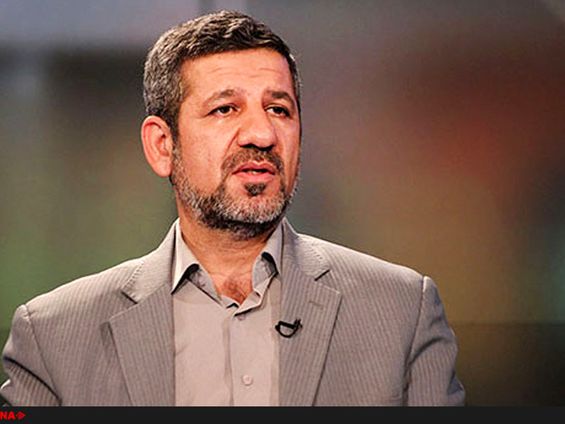
Moghaddam said that a part of the conservative camp in Iran believes in establishing an Islamic government albeit based on their own definition and interests. Another part, he said, maintain that an Islamic government is impossible without an Islamic Republic. In other words, the two groups differ on the role of the people in the government.
In Iran, the late founding father of the ultraconservative Paydari party, Ayatollah Mohammad Taqi Mesbah Yazdi said on many occasions that the people should have no part in the government and it is God who appoints the country's leaders. He even insisted that the leader's aides are also chosen by God rather than the people.
Moghaddam said that the Paydari Party is following the idea of establishing an Islamic government. He added that the two opposing conservative groups need to come to some sort of accord, otherwise, none of them can survive in Iran's political landscape. He also maintained that prejudiced support for the idea of Islamic government can deter the people and put an end to their support for the government.
Moghaddam himself is one those who believes in the Islamic Republic rather than an Islamic government. By warning about loss of popular support, he distanced himself from Paydari party which holds the majority both in the Majles and in Raisi's government. He further stressed that "talking about an Islamic government in Iran would be a mistake."
Asked how the two conservative groups can resolve this dichotomy, Kanani Moghaddam said: "They need to follow the Supreme Leader, otherwise, insisting on one of the two ideas will intensify factional infighting."
Regarding the status of Ghalibaf's "neo-con" group, he said that it is also one group among many other conservatives including traditional conservatives, moderate conservatives, conservative critics of the government, revolutionary groups and several conservative coalitions.
That degree of diversity among conservatives is healthy, but if their competition leads to conflicts and confrontations, then none of them can claim to represent the conservatives.

President Ebrahim Raisi has threatened to destroy the Israeli cities of Tel Aviv and Haifa in an inflammatory speech in Tehran.
Speaking at a military parade for Army Day on Tuesday, he said: “The enemies, especially the Zionist regime, have received this message that the smallest action against Iran will result in a response from the armed forces and will lead to the destruction of Haifa and Tel Aviv.”
Raisi also demanded that US military forces quit the region, saying: “The presence of foreign forces threatens the security of the region, but the Iranian armed forces provide security wherever they are.
"The sooner they leave, the better it will be for the people of the region.”
Raisi’s speech is only the latest in a stream of chilling threats made by the Iranian regime against Israel. Apocalyptic warnings of “wiping Israel off the map” have been met with alarm by both Israel and the international community.
However, despite the alarming rhetoric, Israel’s intelligence military superiority is borne out by a long history of attacks carried out successfully against Iranian nuclear and military facilities. In recent years, Israel has launched air strikes against Iranian military sites in Syria and also inside Iran.
The inability of Iran to defend itself against these attacks has exposed how it lacks Israel's level of technology and resources.
Raisi’s inflammatory threats follows a flare-up of violence in the region, where Iran's allies and proxy forces among militant Palestinians, the Lebanese Hezbollah and forces based in Syria launched multiple rocket attacks earlier this month.
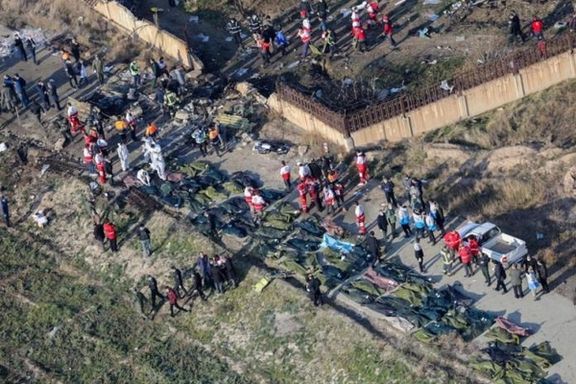
Families who lost loved ones in the downing of a Ukrainian passenger plane in 2020 are outraged by light sentences issued for a few low-ranking military men.
“Is this Islamic justice? A trash bin was burned [during protests], and a young man was executed [for that]. By deliberate shooting of two missiles 176 individuals and an unborn baby were killed and it resulted in thirteen years of prison for someone whose role in this case is not clear,” Beheshteh Rezapour who lost her 33-year-old daughter, in the tragic incident said in an interview with Iran International TV.
“So, commanders, those who issued the order, where do they stand in this case?” she added.
Mehrdad Zarei whose eighteen-year-old son Arad died in the incident in a video released on social media accused Supreme Leader Ali Khamenei, IRGC Commander Hossein Salami, Amirali Hajizadeh, the head of the IRGC aerospace force, Ali Shamkhani, secretary of the Supreme National Security Council and other military and government officials of responsibility for the downing and said they should be put on trial by an independent international tribunal or “after Iran's freedom”.
Some journalists and activists have also criticized the court process and the ruling.
Political activist Abdollah Momeni in a tweet pointed out that activist Mehdi Mahmoudian and women's rights activist Bahareh Hedayat are currently serving the same sentence as the unnamed top defendant in the Ukrainian flight case, only for lighting candles at a rally to honor the memory of the victims of the incident. “This is exactly what judicial justice is in the Islamic Republic!”
“Those who were killed in the shooting down of the Ukrainian plane had names and identities, but the names and identities of the defendants supposedly put on trial was not announced…When a crime is public nobody will believe a trial that is secretive,” Mohammad-Javad Akbarin, a Muslim scholar and former cleric tweeted.
The Association of Families of Flight PS752 Victims has also criticized the ruling and said the case will remain open with the people. According to the Association, more than 70 complainants from the families of victims withdrew their complaints prior to the announcement of the ruling and refuted the court’s competence to prosecute the crime.
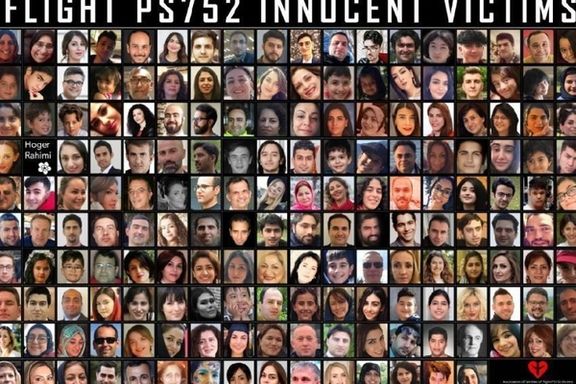
“The governments of the four other affected countries are not absolved of their responsibility to seek justice for their citizens,” the association said in a statement Monday. The group demanded the referral of the dispute to the International Court of Justice immediately after the end of the arbitration period, on June 28, 2023 as well as listing the IRGC as a terrorist entity.
More than three years after the incident, Iran's judiciary on Sunday sentenced the unnamed commander of the IRGC’s Tor-M1 surface-to-air missile system that shot down the plane to 13 years, of which he will be required to serve 10 years including the time he has already spent in prison. Nine others were also sentenced from one to two years.
Iran's foreign ministry spokesperson, Nasser Kanaani, on Monday insisted that Iran has carried out all its duties regarding the case “in accordance with the Chicago Convention” and its own laws and regulations, adding that families of the victims will be paid compensation.
According to Kanaani, there were 117 plaintiffs in the case who were represented by 20 lawyers during the trial. Defendants can appeal the ruling within twenty days from the time of being notified of the ruling, he said.
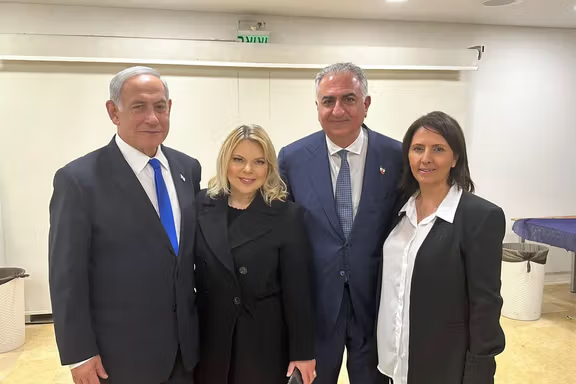
Prince Reza Pahlavi, a leading opposition figure visiting Israel, held a brief meeting with Prime Minister Benjamin Netanyahu Monday as he made a historic visit to Israel.
Pahlavi attended a ceremony held at the National Holocaust Memorial and Museum, Yad Vashem, as part of the Holocaust Remembrance Day. He stood alongside Netanyahu and Israel's President Isaac Herzog but did not deliver a speech. Later he held a meeting with Netanyahu in the presence of Israel’s intelligence minister Gila Gamliel.
This is the first time a prominent Iranian political figure has paid a public visit to Israel. Before leaving for Israel on Sunday, Prince Pahlavi tweeted that he wanted, “to deliver a message of friendship from the Iranian people…and pay respects to the victims of the Holocaust on Yom HaShoah.”
There are no reports so far about what Netanyahu and Pahlavi discussed during their brief meeting, but a photo showed the two deeply engaged in conversation.
The visit comes as Israeli officials and media commentators have raised increasing concern over Iran’s intensified efforts to create instability in and around Israel.
Speaking on Sunday at a memorial service, Israeli Defense Minister Yoav Gallant warned, “Iran is waging a multi-front war of attrition against the State of Israel,” adding that it was “continuing its attempts to establish itself on the northern front and at the same time sending its proxies to Judea, Samaria and Gaza.”
However, Gallant said that Israeli Defense Forces (IDF) have “acted and will continue to act in all arenas, in overt and covert operations along the border, across the border, and even far from the border.”
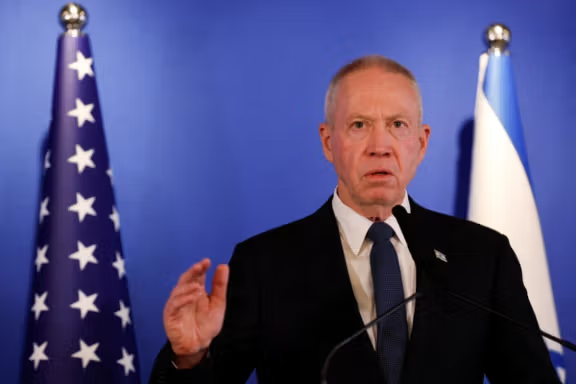
IDF is braced for possible attacks by Iran-backed militias, which launched several rounds of strikes earlier this month on Israel’s southern and northern borders. In an unprecedented development in recent times, the attacks originated from Syria and Lebanon as well as the Gaza Strip.
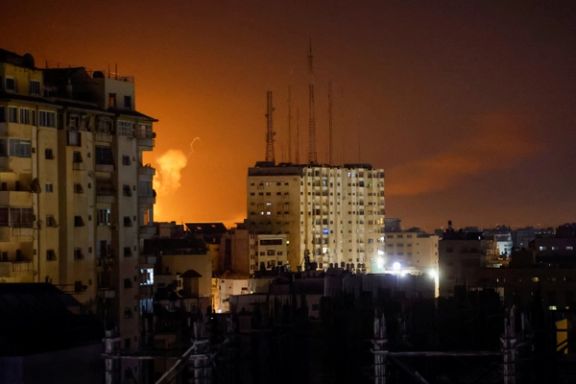
Analysts believe that the Islamic Republic intensified attacks by its allies and proxies in the belief that Israel is at a weak point, due to internal political unrest caused by Benjamin Netanyahu’s plans to overhaul the country’s judicial system.
On Sunday, the Jerusalem Institute for Strategic Studies published a statement, warning of the prospect of a war with Iran, and urging Netanyahu to suspend his judicial overhaul plan considering the intensified threats by Tehran.
“Israel is seen from the outside as a torn society, gradually losing its ability to function,” the think tank said, echoing last week’s remarks by former National Security Advisor and former Maj.-Gen. Yaakov Amidror.
“Israel’s enemies are gaining confidence and expect the internal conditions in the Jewish state to lead to self-destruction,” it added, warning, “The chances of a deterioration into a wider conflict are more significant today than before... Israel needs to prepare for the tangible possibility of war.”
Netanyahu, also speaking at Sunday’s memorial service, said that Israel must always be able to defend itself, adding that if other powers such as the US want to mobilize to help, that is good, “but we cannot build our national security on the foundations of others.”
His statement is indicative of Israeli concerns over Washington’s hesitation to help Israel militarily in case of a confrontation with Iran, especially considering the Islamic Republic’s recent détente with Saudi Arabia.
Also on Monday, Israeli Foreign Minister Eli Cohen held a meeting with American senior Republican Senator Lindsey Graham, who arrived in Israel from a visit to Saudi Arabia, stressing the need for strong Washington-Jerusalem coordination to prevent a nuclear Iran.
Netanyahu met with Graham on Monday and talked about Israel normalizing relations with Saudi Arabia, saying it would be a "giant leap" towards ending the Arab-Israeli conflict.
Netanyahu said, "We want normalization and peace with Saudi Arabia...This agreement could have monumental consequences, historic consequences both for Israel, for Saudi Arabia, for the region and for the world."
Cohen said, "Cooperation between Israel and the United States is necessary to stop the Iranian nuclear program, which is a global threat.
“The way to change Iranian behavior is through massive economic and political pressure, in every sector of Iranian interest,” coupled with a credible “military threat against it.”
Tehran turned to Lebanon’s Hezbollah to initiate the latest episode of its proxy war against Israel, during which Hezbollah fired a surveillance drone toward the Galilee on April 1 that was shot down by Israel. From April 5-7, Palestinians affiliated with Hamas and based in Lebanon fired fired 34 rockets at Israel. On April 8 and April 9, six rockets were launched from the Syrian side of the Golan Heights.
According to a report in The Wall Street Journal, prior to the most recent coordinated attacks, Esmail Ghaani, the leader of IRGC’s Quds Force, hosted representatives of Hezbollah, Hamas and Islamic Jihad – all of which designated as terrorist groups by the US and several other countries – at the Iranian embassy in Beirut in March and April.
On Saturday, spokesman of Iran’s Revolutionary Guard Ramezan Sharif said that the US is too weak to be able to militarily support Israel in the region.